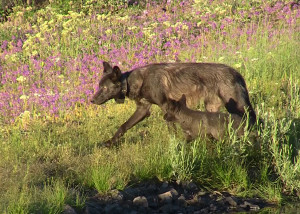
California’s Shasta Pack (CDFW photo)
It is astonishing to folks at Cascadia Wildlands that House Bill 4040 (HB4040) was even a topic of conversation this “short” legislative session. Every other year, the Oregon legislature holds a short session that only lasts around one month, and because of the limited time for discussion and debate, usually only non-controversial bills are taken up.
However, this session the House passed and the Senate is seriously deliberating over HB4040 despite tremendous controversy, deceit, and enormous amounts of misinformation. HB4040 would legislatively remove the gray wolf from the state list of threatened and endangered species, precluding the public’s right to judicial review to ensure that the delisting is scientifically and legally sound.
This bill’s success thus far has been unbelievable for a number of reasons. First, Oregon still only has around one hundred wolves in the state. This is approximately seven percent of the state’s purported ecological capacity, and the wolves only occupy about 12 percent of their suitable habitat in the state. Most of the wolves are still concentrated in the northeast corner of Oregon. We believe that these statistics alone show that wolves, while on the path to recovery (we had zero wolves 10 years ago), have not fully recovered and are not ready for critical protections to be removed. The scientific community has largely agreed with us and offered widespread critique of the Oregon Department of Fish and Wildlife Commission’s proposal to delist.
Second, Oregon has democratic majorities in both the House and the Senate. We believed, as did the Salem Statesman Journal, that democrats supported the concept that environmental decisions should be made on the basis of sound science and not politics. In the past, democrats in Oregon have prevented the intervention of special interests in wildlife management, especially when involving threatened or endangered species. For example, four of the past five years extremists in the livestock industry and their lobbyists in Salem have introduced bills aimed at removing protections for wolves, and these bills never got serious attention, largely through pushback by democrats. We are dumbfounded as to why democratic legislators in Salem are now kowtowing to special interests given that 96% of people who commented on the delisting encouraged retaining the wolf’s listed status.

Photo taken July 6, 2013 of OR17 with a 2013 pup of the Imnaha pack. Subadult wolves assist in the raising of the pups. Photo courtesy of ODFW.
Third, the bill is undemocratic because it precludes judicial review of ODFW’s delisting decision. Essentially, judicial review functions as a crucial part of our government’s system of checks and balances. The legislature makes laws — general guidelines for agency behavior. The executive or administrative agencies enforce these laws and carry out their execution. The judicial branch ensures that agency actions comply with the laws. Here, ODFW and its Commission delisted the gray wolf. Pursuant to our state laws concerning endangered species, such a finding is required to be based upon the best available science and make certain findings, like whether or not wolves have recovered throughout a significant portion of their range in the state. We believed that because wolves only occupied a small percentage of their range, ODFW failed to make the required findings, and we and our colleagues sought judicial review of the agency decision. HB4040 amounts to the legislature changing the rules of the game after the agency has already made the decision, exempting ODFW from having to make the requisite scientific findings. Again, the Salem Statesman Journal put it well: “It would be grossly unfair, and a bad precedent, for the Legislature to change the rules after the litigation has started.”
Fourth, the bill’s proponents weren’t being truthful in order to pass it through the House. When the bill first popped up, Cascadia Wildlands directed its supporters interested in the wolf topic to contact their representatives and tell them to not vote for the bill for all of the reasons above. The message that was repeatedly received was the representative was supporting the bill because it was simply “a pat on the back” for ODFW, and would not preclude judicial. We were dumbfounded. Upon close scrutiny, the only reason for this bill, its sole effect, is to preclude judicial review of the wolf delisting. Obviously, lobbyists and even legislators pushing this bill were not being truthful about its effects, and legislators regurgitating this refrain either refused to look at the bill or made a conscious choice to spread the misinformation further.
The true purpose of the bill was uncovered before the Senate Committee on Environment and Natural Resources this week through the honorable efforts of Senators Michael Dembrow and Floyd Prozanski. But instead of killing the bill because of the blatant deceit or at the very least sending it back down to the House with full disclosure about the bill’s intent and effects, the Senate Committee passed the bill with a vote of 3 to 2, with Senators Dembrow and Prozanski voting against the bill, and Senator Chris Edwards (D-Eugene) supporting it along with two republicans on the Committee.
It appears the divisive politics paralyzing Washington DC and partisan game playing have now infected our state.
We have allies in this fight for sound science. State Senators Dembrow and Prozanski have worked hard to defeat the bill. Representative Peter DeFazio (D-OR) has taken up the effort, calling out fellow state democrats for their betrayal of sound science for political games.
Although this bill ultimately passed, it passage resulted in the filing of several ethics complaints against Representatives that lied to secure the bill’s passage. And even though the bill was designed to kick our wolf delisting challenge out of court, our case was ultimately reinstated and argued in February before the Oregon Court of Appeals. We will of course keep you updated on developments, and thank you for standing up for Oregon’s recovering wolves.
